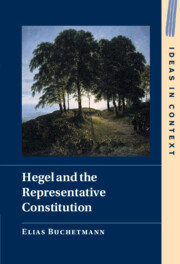Book contents
- Hegel and the Representative Constitution
- Hegel and the Representative Constitution
- Copyright page
- Dedication
- Contents
- Acknowledgements
- Conventions and Abbreviations
- Introduction
- Chapter 1 The Constitutional Question in Post-Napoleonic Germany
- Chapter 2 On the Nature of Constitutions
- Chapter 3 The Distribution of Power
- Chapter 4 Debating the Two-Chamber System
- Chapter 5 The Representation of Interests
- Conclusion
- Bibliography
- Index
Conclusion
Published online by Cambridge University Press: 13 April 2023
- Hegel and the Representative Constitution
- Hegel and the Representative Constitution
- Copyright page
- Dedication
- Contents
- Acknowledgements
- Conventions and Abbreviations
- Introduction
- Chapter 1 The Constitutional Question in Post-Napoleonic Germany
- Chapter 2 On the Nature of Constitutions
- Chapter 3 The Distribution of Power
- Chapter 4 Debating the Two-Chamber System
- Chapter 5 The Representation of Interests
- Conclusion
- Bibliography
- Index
Summary
Several years after Hegel’s death, an entry on ‘Hegel’s philosophy and school’ appeared in the renowned Staats-Lexikon, or Encyclopedia of the Sciences of State, edited by Carl von Rotteck and Carl Theodor Welcker. With its author Karl Hermann Scheidler a former student of Hegel’s lifelong rival Fries, the article can hardly be described as even-handed and Marx famously referred to it as ‘muck’. For the concerns of this book, Scheidler’s pronouncement that ‘Hegel declares himself generally for the representative constitution indeed’ is of especial interest. He is quick to add, however, that Hegel ‘does this in a manner […] which clearly shows that the true idea of the representative system in no way became clear to him and that he understands next to nothing of constitutional monarchy’. Scheidler especially reprehends Hegel for ignoring ‘the important difference between the estate-based and the representative constitution which more recent theorists of the state […] endeavour to determine so precisely’. That is the point exactly, however. At the time Hegel was writing, such a distinction was far from established.
- Type
- Chapter
- Information
- Hegel and the Representative Constitution , pp. 209 - 212Publisher: Cambridge University PressPrint publication year: 2023

